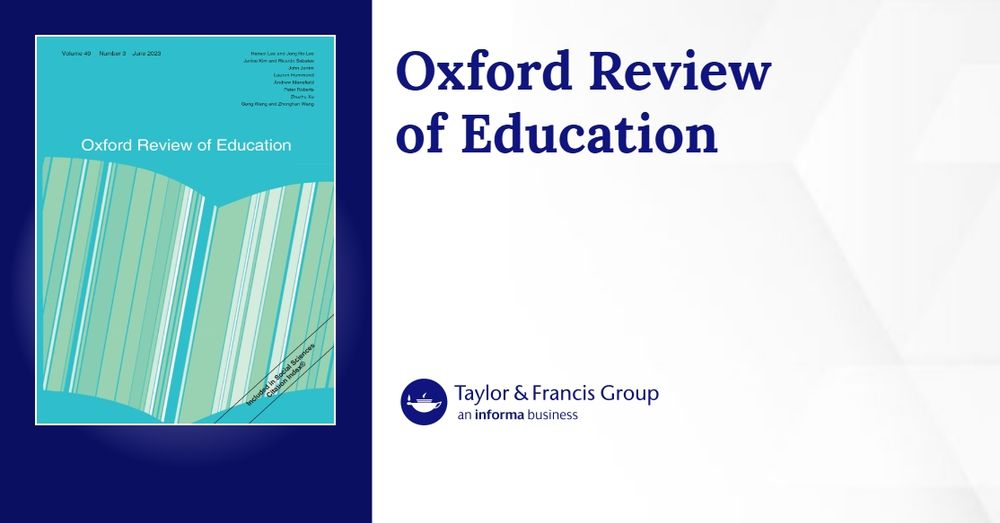brianboyle.phd

@nclpolitics.bsky.social
@strathpolir.bsky.social
jacciz.github.io/portfolio/pr... Lots of good advice in this post. Too bad one (better, I) keeps forgetting about some practices in the process and follow bad practices
jacciz.github.io/portfolio/pr... Lots of good advice in this post. Too bad one (better, I) keeps forgetting about some practices in the process and follow bad practices


Interested? Then check out our new Electoral Studies paper @jess-smith.bsky.social @viktorv.bsky.social @danjdevine.bsky.social @hannahbunting.bsky.social @carolineleicht.bsky.social
Interested? Then check out our new Electoral Studies paper @jess-smith.bsky.social @viktorv.bsky.social @danjdevine.bsky.social @hannahbunting.bsky.social @carolineleicht.bsky.social
Whether you have access to the Research API or just want to scrape some pages, traktok has you covered
jbgruber.github.io/traktok/
Whether you have access to the Research API or just want to scrape some pages, traktok has you covered
jbgruber.github.io/traktok/
What share of the 6% tariff different universities may try to pass on to fees - or the impact might be on demand if they did - is not publicly known.

What share of the 6% tariff different universities may try to pass on to fees - or the impact might be on demand if they did - is not publicly known.
👇you can find more info on how you can help & a detailed report.
All info on workshops: bit.ly/3wBeY4S 1/n

👇you can find more info on how you can help & a detailed report.
All info on workshops: bit.ly/3wBeY4S 1/n
My book 𝘛𝘩𝘦 𝘔𝘢𝘬𝘪𝘯𝘨 𝘰𝘧 𝘐𝘯𝘵𝘦𝘳𝘯𝘢𝘵𝘪𝘰𝘯𝘢𝘭 𝘚𝘵𝘢𝘵𝘶𝘴 is finally out in the world!
📘 academic.oup.com/book/61560

My book 𝘛𝘩𝘦 𝘔𝘢𝘬𝘪𝘯𝘨 𝘰𝘧 𝘐𝘯𝘵𝘦𝘳𝘯𝘢𝘵𝘪𝘰𝘯𝘢𝘭 𝘚𝘵𝘢𝘵𝘶𝘴 is finally out in the world!
📘 academic.oup.com/book/61560
osf.io/download/vwb5h
osf.io/download/vwb5h

My new article in @ejprjournal.bsky.social finds: Yes, sometimes, but this is not the norm.
Let's break it down. 🧵 1/10

My new article in @ejprjournal.bsky.social finds: Yes, sometimes, but this is not the norm.
Let's break it down. 🧵 1/10
arxiv.org/abs/2511.044...

arxiv.org/abs/2511.044...


a 🧵 1/n
Drain: arxiv.org/abs/2511.04820
Strain: direct.mit.edu/qss/article/...
Oligopoly: direct.mit.edu/qss/article/...




a 🧵 1/n
Drain: arxiv.org/abs/2511.04820
Strain: direct.mit.edu/qss/article/...
Oligopoly: direct.mit.edu/qss/article/...
This would mean about 1 in 8 members of staff losing their jobs. With hundreds of jobs already lost, a further 1,000+ jobs are on the line.
www.instagram.com/p/DQuFjwBjHB5/
This would mean about 1 in 8 members of staff losing their jobs. With hundreds of jobs already lost, a further 1,000+ jobs are on the line.
www.instagram.com/p/DQuFjwBjHB5/
We are looking forward to reading your work :)
@ecpr.bsky.social @ecprgender.bsky.social
@nclpolitics.bsky.social
#polsci, #PoliticalScience, #Methodology, #Researchmethods
Have you seen these biases in your own research?
Come join the debate—submit your work by Nov 7!
@ecpr.bsky.social @ecprgender.bsky.social @nclpolitics.bsky.social
Want to critically discuss “quant” and “quali” research on gender, intersectionality & inequality?
Join us at #ECPG26 for the section:
ecpr.eu/Events/Event...
1/3
We are looking forward to reading your work :)
@ecpr.bsky.social @ecprgender.bsky.social
@nclpolitics.bsky.social
#polsci, #PoliticalScience, #Methodology, #Researchmethods
Political Scandals and Vertical Contagion in Multilevel Systems - cup.org/47wHeJB
- @jaclarner.bsky.social, Robert Johns, @ailsahenderson.bsky.social, @frasmcm.bsky.social & @cjcarman.bsky.social
#OpenAccess

Political Scandals and Vertical Contagion in Multilevel Systems - cup.org/47wHeJB
- @jaclarner.bsky.social, Robert Johns, @ailsahenderson.bsky.social, @frasmcm.bsky.social & @cjcarman.bsky.social
#OpenAccess

(and two weeks left to apply for the PhD positions, the deadline is on the 24th of November: www.jobbnorge.no/en/available...)
(and two weeks left to apply for the PhD positions, the deadline is on the 24th of November: www.jobbnorge.no/en/available...)
You do quant text analysis? You are interested in political representation? Enjoy working in teams? Would like to live in a great city? Consider joining us in Vienna!
⏱️ Apply by 15/12/2025
wratil.eu/files/MULTIR...
1/4 🧵

You do quant text analysis? You are interested in political representation? Enjoy working in teams? Would like to live in a great city? Consider joining us in Vienna!
⏱️ Apply by 15/12/2025
wratil.eu/files/MULTIR...
1/4 🧵



